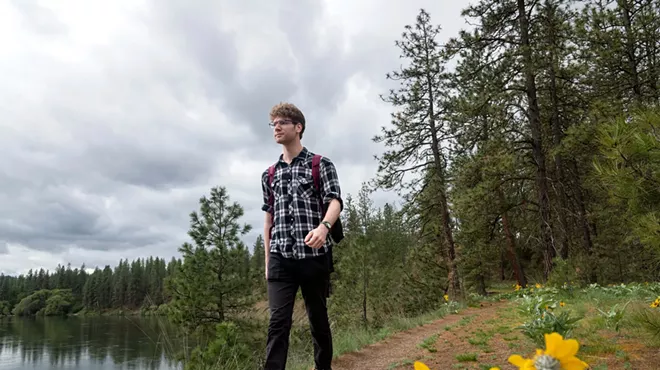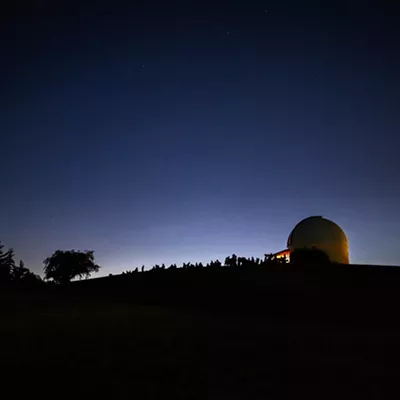In the summertime, we crane our necks upward to gaze at the full moon, shining brightly in the clear sky. We point at the Big Dipper with gloved hands in the wintertime, trying to make out constellations through the gaps between clouds.
Humans are naturally curious about the universe and what's beyond the limits of our atmosphere. Stargazing satiates the innate need to make sense of the universe and our place in it. Whether you're locating Orion's Belt with the naked eye or peering at Saturn's rings through a telescope, the Inland Northwest is a prime area for all stargazing enthusiasts.
Around here, casual stargazers can catch plenty of astral events from the comfort of their own backyard, or by traveling less than an hour from city limits.
"There are a ton of places near Spokane and in North Idaho that are great for stargazing without any major equipment," says Kelly Guzman, founder of the North Idaho Astronomy Club. "North Spokane is pretty dark because it's just far enough away from all of the major light pollution. Cheney also fits into that."
As long as you don't live in the heart of downtown Spokane, stargazing is an easy hobby to take up. Step out into your backyard or onto your balcony and look up. Chances are you'll be able to see many constellations, planets and satellites as they come into view — if the sky is clear.
"Spokane and surrounding areas get about 170 days of clouds a year," Guzman says. "If you're hoping to start, now is the ideal time as astronomy is primarily a spring and summer activity. The most accessible events are meteor showers. ... They occur every year and you don't need a lot, or any, equipment to enjoy them. You shouldn't have to break the bank to enjoy astral events."
The world of stargazing is at your fingertips — literally. Smartphone apps have made stargazing easier than ever, and there's no shame in using them. Stargazing apps work by using GPS and location software to pinpoint your location and, therefore, what astral entities you can see based on that information.
Apps like Sky Guide can be helpful when attempting to see specific events or objects.
"The app will even tell you when Starlink satellites are passing over or when the International Space Station is set to come by," Guzman says. "Cellphones have made astronomy extremely accessible."
Along with certain apps, the internet has ample resources for beginner stargazers.
"My personal recommendation is to use Sky and Telescope's 'Sky at a Glance' feature," she says. "You can see what events are happening in the next week or so. It makes planning for weather and equipment easier."
I
NORTH IDAHO ASTRONOMY CLUB
northidahoastronomyclub.org
fb.com/NorthIdahoAstronomyClub
SPOKANE
ASTRONOMICAL SOCIETY
spokaneastronomical.org
fb.com/SpokaneAstronomy
Paul Yost, a board member of the Spokane Astronomical Society, recommends joining the club's mailing list to get connected with other members.
The Spokane Astronomical Society meets at the Fishtrap Recreation Area, about 30 miles southwest of Spokane. The remote location makes for a quiet night of looking into dark skies for bright stars, galaxies and nebulas.
"We have star parties on the Saturday closest to the new moon," Yost says. "We choose that date because the moon is at its dimmest, making it easier to see deep space objects with our telescopes. Even though we're far from city light pollution, the light from the moon can also interfere with clear images."
The members of the Spokane Astronomical Society are more than willing to let newbies peer through their telescopes. Yost says that attending meetings and going out into the field with the club is the best way to gauge your own personal interests. From there, dedicated stargazers can choose what kind of telescope they want to purchase based on what they want to focus on finding in the night sky.
If you're not ready to buy a telescope or you want to hone in on your personal astronomical interests, the Spokane Astronomical Society lets members check out various telescopes free of charge.
"I always encourage people to attend meetings before they go all-in," says Yost. "You can come and hang out without paying the membership fee right away. We're just happy to have you." ♦


























